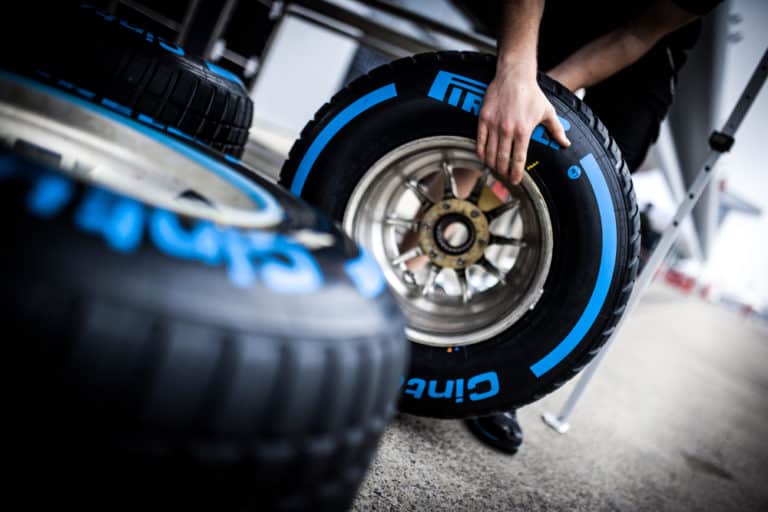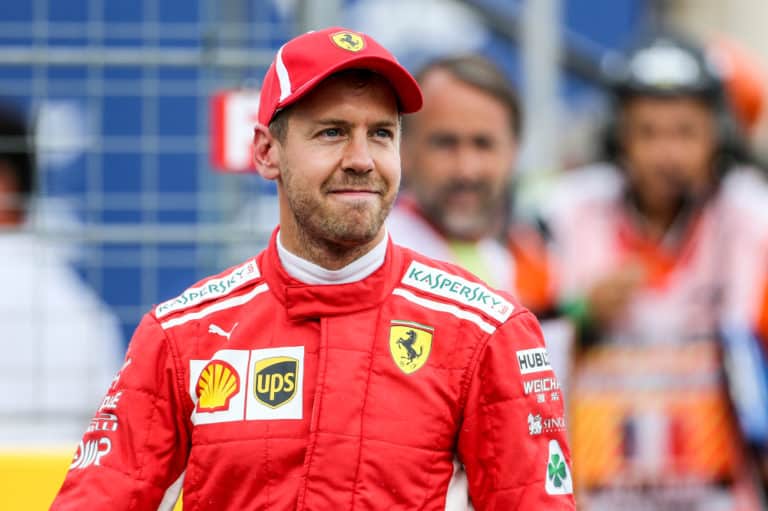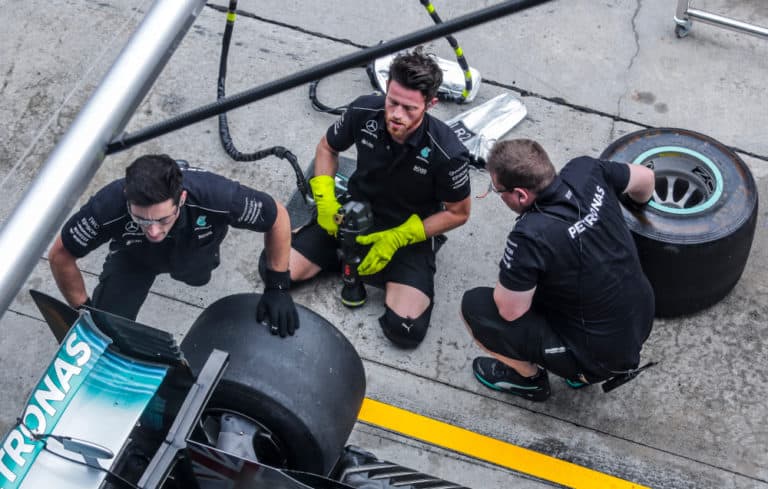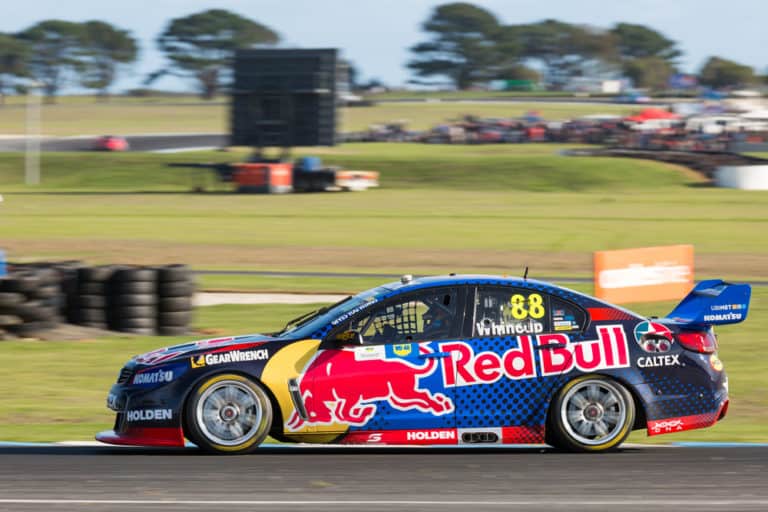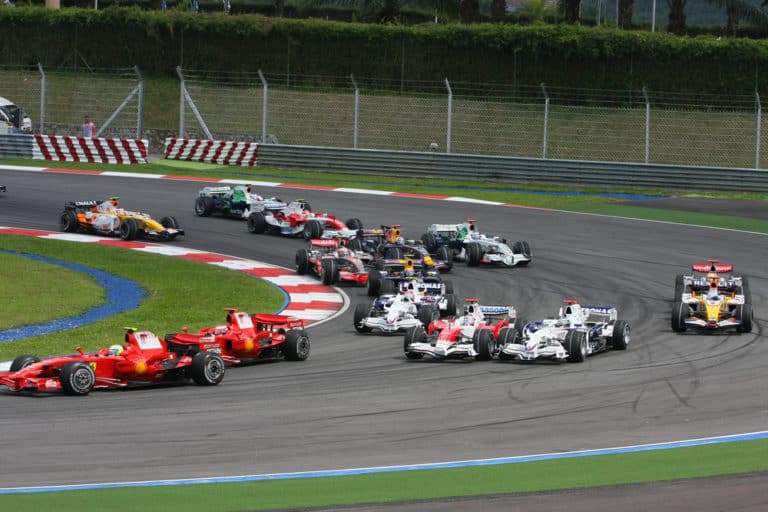If you want to become a Formula One doctor, understanding the path there is crucial. For those interested in this career path, it’s crucial to consider F1’s current medical employees and their career paths to better understand the roadmap to their dream job!
To become a Formula One doctor, you need to choose a medical field to specialize in. There are many FIA-certified medical professionals working for F1, including medical doctors, sports psychologists, nutritionists, and osteopaths. Training programs bridge the gap for doctors going into motorsport.
If it’s your goal to become a Formula One doctor, we’ll explain everything you need to know about the career path to working with global racing teams as a medical professional. We’ll provide a detailed look at the different medical roles in the world of F1 and how you can get involved professionally!
If you’re looking for some F1 merchandise, check out the awesome stuff at the official F1 store here.
The Career Path Of Formula 1 Doctors
Many Formula One fans don’t realize the full extent of the teams behind the scenes. Of course, there’s the vital pit crew. However, there’s also a multidisciplinary team of medical professionals who help keep F1 drivers healthy, both physically and mentally.
An important aspect to note here is multidisciplinary, which refers to the combination of several professional specializations towards a common goal. In Formula One, this common goal is primarily the health of drivers. Naturally, this means that a wide variety of medical professionals work for Formula 1.
While many F1 teams employ private doctors and medical professionals, others join medical teams like Formula Medicine. Founded in the early 90s, Formula Medicine is a specialized Sports Medicine Centre headquartered in Italy. However, Formula Medicine has a team of specialists who operate across all five continents.
Regardless of whether a doctor is employed privately by a team or through a center like Formula Medicine, they have a few things in common. Firstly, they would have chosen a medical field and completed their studies in that field. Secondly, they will have completed medical training programs pertaining to motorsports, which allows medical professionals to bridge the gap in the world of motorsport.
However, there is another thing all doctors employed by Formula 1 have in common: they are FIA certified. Of course, the Federation Internationale de l’Automobile (FIA) is the governing body that seeks to promote safety, sustainability, and accessibility in motorsport. The FIA is responsible for ensuring that safe events are conducted globally.
Of course, medical professionals and doctors play a vital role in the safety of these events. Naturally, this is the reason Formula One doctors all need to be FIA certified. From choosing a medical specialization to becoming an FIA-certified Formula One doctor, let’s take a closer look at this career path!
Which Doctors Work For Formula One?
To work in the medical field in a motorsport setting, you need to think methodically, even in stressful situations. Of course, many medical professionals work with F1 drivers before and after races, but there are also those present at the circuits.
If you’re aspiring to be a Formula One doctor, you’ll also need to decide on which medical branch to specialize in. Luckily, many branches of medicine are vital to F1 and motorsport. In fact, due to the multidisciplinary nature of F1 medical teams, there are many medical professions to consider!
By bringing various medical professionals together, all aspects of an individual’s physical and mental health can be addressed. After all, being a Formula One doctor isn’t just about medical assistance; it’s also about athletic and mental preparation. Regardless of which type of F1 doctor you’re aspiring to be, there are many ways you can get involved in the medical motorsport world.
Doctors
Formula One employs many medical doctors, who are also known as physicians or general medical practitioners. However, many advanced clinical professionals also work with racing teams, typically at the level of a middle-grade doctor. There are also many consultants who work with these racing teams, such as radiologists and sonographers.
Paramedics
Paramedics are another vital group of medical professionals involved with motorsport. Of course, paramedics specialize in pre-hospital medical and trauma care. Often, paramedics also work with emergency physicians, who usually work in a hospital’s emergency department.
In the F1 Medical Car, there is always a medical rescue coordinator and a doctor specializing in emergency medicine. These professionals will work alongside paramedics to properly deal with medical emergencies and accidents on the circuit.
Psychologists
As we mentioned earlier, a multidisciplinary medical approach allows medical professionals to collectively focus on all physical and mental aspects of a driver’s health. Psychologists play an important role in this regard. Of course, psychologists typically work with individuals to identify and diagnose mental, behavioral, and emotional disorders.
Naturally, psychologists play a crucial role in monitoring the mental health of F1 drivers. Formula One also employs many sports psychologists, who are psychologists who have further specialized in applying psychological principles in sports settings. Of course, this includes working with athletes and drivers.
Physiotherapists
Of course, Formula One also hires many physiotherapists. These medical professionals are equipped to help drivers deal with conditions like sprains, back pain, strains, posture problems, sport-related injuries, and more. As part of a multidisciplinary team, physiotherapists can focus on muscle-related conditions.
Athletic Trainers
Athletic trainers are another group of medical professionals hired by racing teams. These professionals design rehabilitation programs for injured drivers. Athletic trainers are specialized in preventing, diagnosing, and treating conditions, illnesses, and injuries related to bone and muscle.
Nutritionists
Nutritionists, particularly sports dieticians, play an important role in the training and performance of motocross drivers. These professionals work alongside other doctors to develop strategies for drivers to eat well. By focusing on this, drivers can optimize their training, performance, and even how fast they recover after an injury.
Osteopaths
Formula One also employs many osteopaths, who use their medical knowledge and experience to restore the functionality and stability of a driver’s joints. Osteopaths typically use a combination of forceful and gentle techniques, which are based on the symptoms of their patient.
Chiropractors
Chiropractors employed by F1 work alongside psychotherapists and athletic trainers to prevent, diagnose, treat, and manage musculoskeletal disorders. Furthermore, F1 chiropractors use their expertise to treat and manage disorders linked to the nervous system and even general health.
How Doctors Can Get Involved In Formula One
To become involved in motorsport as a doctor, there are two courses that are widely recommended. The first is an Advanced Trauma Life Support (ATLS) course, followed by a Pre-Hospital Trauma Life Support Course (PHTLS). Of course, these courses provide doctors with the necessary skills to deal with high-stress environments.
Once these courses have been completed, aspiring Formula One doctors should get involved with local racing teams. There’s always a need for more doctors, paramedics, nurses, and rescue team members in motorsport. By getting involved in local motorsports, doctors and medical professionals can develop their skills and gain experience.
Ultimately, the right skills and experience are crucial when looking for opportunities in the ranks of Formula One. However, with the right medical specialization, training programs, and experience, you can work your way up! As we mentioned earlier, doctors working with F1 need to be FIA-certified.
As the world’s leading motorsport governing body, the FIA understands that motorsport is equally mechanical and human. While the mechanical aspect is crucial to motorsport, there wouldn’t be a sport without the dedicated drivers behind the wheel.
Of course, that’s why the health and safety of drivers and co-drivers are of the utmost importance. Given that the FIA is the governing body for Formula One (and many other racing events). By certifying their doctors, the FIA can ensure their drivers and teams receive the best medical care and support.
In fact, the FIA has an ever-expanding medical training program that prepares doctors and medical professionals for the fast-paced world of F1. This training program was designed to advance the development of medical professionals who work in motorsport.
This program also seeks to introduce these professionals to new medical technologies and techniques. Furthermore, the FIA ensures that this program prioritizes the development of training initiatives and educational materials. To facilitate this goal, FIA works alongside the National Sporting Authorities (ASN).
Ultimately, becoming a Formula One doctor is all about having the right skills and experience. If you focus on these aspects, you’ll be able to work your way up to the F1 leagues!
What Do Formula 1 Doctors Do?
If you want to be a doctor for Formula One, it’s crucial that you understand what exactly F1 doctors do. Of course, we briefly looked at this when we outlined the different medical professionals that are hired by F1.
To better understand this, we can look to Formula Medicine and its team of doctors, psychologists, psychotherapists, athletic trainers, nutritionists, and osteopaths. These professionals work together daily to prioritize the physical and mental aspects of an individual’s well-being.
Formula Medicine applies the expertise of these medical experts in four main areas. The first is Driver Monitoring, followed by Check-Up and Training Programs. Then you have Trackside Assistance and Safety and, lastly, Training Camps/Talent Scouting.
Driver Monitoring
The doctors working for Formula Medicine have developed advanced technologies to obtain reliable and complete health data from drivers. The data that is collected while a driver is on the circuit is used alongside data collected away from the circuit.
Due to the way these technologies have been developed, doctors can objectively assess the psycho-physical aptitudes that F1 drivers require. This includes focusing on aspects like improving dietary and hydration habits, as well as presenting drivers from psycho-physical stress. Now you’re starting to see how these different medical professionals work together in the world of F1!
Driver Check-Up And Training Programs
Whenever a Formula One driver goes to Formula Medicine, the first step is always to complete a check-up. There are three parts to this check-up, namely medical, mental, and athletic. This is crucial for drivers to develop a training program customized to their specific needs.
While developing and executing a driver’s training program, many of Formula Medicine’s medical professionals come together. In addition to nutrition, physiotherapists and rehabilitation specialists work together to form customized training programs for drivers. By working with the rehabilitation specialists, the FIA can ensure drivers recover from injuries while training.
Trackside Assistance And Safety
Doctors working for Formula One also specialize in trackside assistance and safety. Of course, this is where emergency trauma courses will come in handy. For more than three decades, Formula Medicine and its medical professionals have been providing trackside services to F1 drivers and teams.
There are many trackside requirements that need to be fulfilled by these medical professionals. This includes mental, medical, athletic, and physiotherapy requirements. It’s no wonder a multidisciplinary approach is used! Formula Medicine also plays a crucial role in standardizing race circuits for efficiency and safety.
Training Camps And Talent Scouting
Scouting is a crucial part of Formula One. After all, they’re looking for the world’s best drivers! Formula Medicine has designed training camps that are tailored to younger talents. These training camps often work with young children, such as kart drivers, to give them the skills required to compete competitively later in life when they reach maturity.
Due to these training camps, many Formula 1 teams and managers entrust Formula Medicine with finding the most promising motorsport talents – at least in terms of their mental aptitude words this fast-paced career path. Medical professionals, of course, play a vital role in the development and success of these training programs.

Conclusion
In order to become a Formula One doctor, you must first choose a specialized medical field. Medical doctors, sports psychologists, nutritionists, and osteopaths are some of the FIA-certified medical professionals working for F1. Training programs and local motorsport experience help bridge the gap for medical professionals looking to work in motorsport.
Sources
- https://www.fia.com
- https://www.formulamedicine.com
- https://www.formulamedicine.com/en/about-us/
- https://www.fia.com/medical
- https://www.fia.com/medical-programme
- https://www.motorsportmedics.org.uk/
- https://www.fiafoundation.org/our-work/motor-sport-safety/projects/medicine-in-motor-sport
- https://www.formula1.com/en/latest/article.driving-f1-medical-car-worlds-fastest-ambulance.50sdlN2XmoK6g8k0ecGGMO.html

